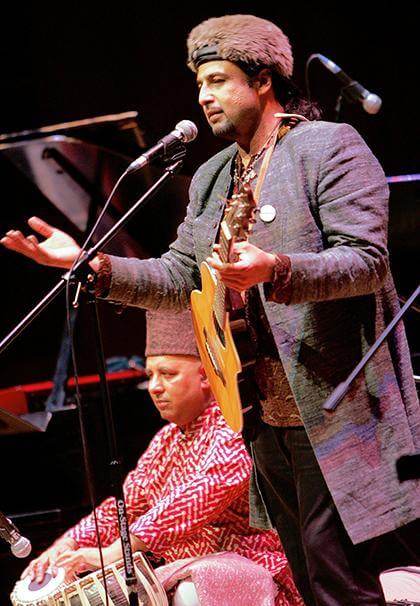By Anna Gustafson
When Salman Ahmad stepped onto the stage at Queens College last week, he was promoting the same message that has long defined his career and vaulted him into stardom as one of Pakistan’s best-known rock stars who has sold more than 30 million albums — unity.
“Music goes beyond faith, goes beyond race, goes beyond ethnicity,” said Ahmad, 45. “Musicians, we connect with our hearts. With music, barriers are broken.”
Ahmad, a Pakistani-born Queens College music professor who has received international acclaim for his band Junoon, played at the March 3 concert known as “Common Chords,” which brings together musicians from a wide variety of backgrounds.
He played, for example, alongside Samir Chatterjee, a renowned Indian tabla musician. The two men from countries that have long been at odds with each other played together at the 2007 Nobel Peace Prize ceremony in Oslo.
The evening’s message of cultural understanding was a familiar one for Ahmad, who has stared down angry mobs and delighted world leaders with his music that calls on individuals to embrace peace and forego stereotypes. He has detailed his life in “Rock & Roll Jihad: A Muslim Rock Star’s Revolution,” a memoir recently published by Simon & Schuster that has been lauded by individuals like singer Melissa Etheridge, who wrote the introduction, to Deepak Chopra, an American physician born in India who has written extensively on spirituality.
“Peace in this world begins with peace in our hearts,” Etheridge wrote. “Salman Ahmad has placed that peace in his heart and it now shines like a beacon for millions of people in the East, the West, and everywhere.”
Born in Pakistan, Ahmad, a Sufi Muslim, moved to Tappan, N.Y., when he was a teenager and set his sights on becoming a musician. He fell in love with bands like Led Zeppelin and The Beatles and learned to play the guitar, but ultimately ended up going to medical school in Pakistan to please his parents.
“Ever since I was young, music affected my soul,” Ahmad said. “My first memory of music was being at a wedding at Lahore and listening to Sufi devotional singing, and it moved me in a way I couldn’t understand at 6-, 7-years-old. Fast forward to me being a teen and seeing Led Zeppelin in Madison Square Garden, and it moved me in the same way. I wanted to play music for the rest of my life.”
While at medical school in Lahore, Ahmad started playing in a rock band whose first appearance was met with jeers from audience members irate with their performance of Eddie Van Halen’s “Eruption.”
“All of a sudden, I heard cries and screams,” Ahmad wrote. “Gratified by the response, I felt vindicated and energized .%u2026 I was, I hoped, on my way to being a rock star after all. But when I opened my eyes, I realized that the cries were not of excitement coming from my audience of classmates. They were screams of rage.”
At that moment, Ahmad said he decided to live his life fighting against the extremism that he has seen throughout the world. Since that first concert, Ahmad decided not to go into medicine and would play the first-ever rock concert in Kashmir, a war-torn area currently divided between India, Pakistan and China; be part of the first Pakistani group to perform in India; and be the first Pakistani musician to play at the Nobel Peace Prize ceremony.
Throughout it all, Ahmad has advocated against extremists, whether they be the individuals he said have hijacked his religion or those in the United States who have denounced all Muslims as terrorists.
“I’m teaching at Queens College because I realize there’s a huge gulf of misunderstanding, that there’s a communication breakdown between America and the Muslim world,” Ahmad said. “Living in America, we need to communicate, communicate, communicate.”
Reach reporter Anna Gustafson by e-mail at agustafson@cnglocal.com or by phone at 718-260-4574.

































